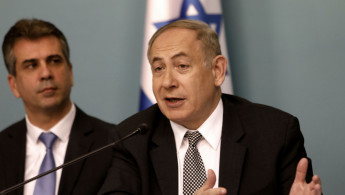Israel's favourite theocracy: Netanyahu defends Saudi Arabia over Khashoggi
On Wednesday, Binyamin Netanyahu told reporters at a reception for foreign journalists that "realpolitik" meant that Israeli interests required defending the kingdom despite the horrific nature of Khaghoggi's murder, in the face of mounting pressure demanding accountability for those behind it.
"What happened in Istanbul is horrific, nothing short of that. It's horrific. And I think that will be dealt with in its own way," Netanyahu said, before qualifying that every country had to figure out how it would react to the killing.
The murder, he said, was "balanced by the importance of Saudi Arabia and the role it plays in the Middle East... because if Saudi Arabia would be destabilised, the world would be destabilised. Not [just] the Middle East... And I think that has to be taken into account".
 |
Netanyahu then attacked Iran's 'dictatorial theocracy' for criticising Saudi Arabia, itself a theocracy and an absolute monarchy |  |
Netanyahu then attacked Iran's "dictatorial theocracy" for criticising Saudi Arabia, itself a theocracy and an absolute monarchy.
"To have this kind of criticism from countries that themselves practice hangings in the public square of journalists or gays or political dissidents - about 1,500 are executed in Iran each year. To have Iran lecture us on this is absurd," he said, although Saudi Arabia also practices public executions including on charges of homosexuality, adultery and "sorcery".
"We always have a tension between the most basic human rights - the right to life," said Netanyahu, whose government continues to enforce a deadly occupation and illegal settlement regime in the Palestinian territories.
"But we also know that on the other side there is also realpolitik. And I don't deny it, I openly say it. There's a balance here, there's always a balance. But to have this criticism emanate from this dictatorial theocracy… that's a measure of hypocrisy we don't have to tolerate," Netanyahu added.
Khashoggi, a former Saudi royal insider who became a critic of Crown Prince Mohammed bin Salman, was murdered at the Saudi Arabian consulate in Istanbul on October 2.
Leaked Turkish intelligence and CIA reports concluded the murder was orchestrated by the highest circles of the Saudi royal family, implicating Crown Prince Mohammed bin Salman.
His death unleashed a global wave of criticism against the crown prince, despite Saudi officials claiming he had no role in the killing.
The 59-year-old journalist was at the consulate in Istanbul seeking documents needed to marry his Turkish fiancee. Riyadh - after weeks of denial - said he was killed in a "rogue" operation.
Although Riyadh denies warming behind-the-scenes relations with Israel, Saudi leaders have made several gestures towards Israel in recent months.
Both countries see Iran as their biggest outside threat and the US as their key ally. But the Israeli-Palestinian conflict has long proved an obstacle to official relations.
In April, during an interview with The Atlantic, Saudi Arabia's Crown Prince Mohammed Bin Salman said Israel had a "right" to a homeland, prompting King Salman to scramble to reject his son's declaration. The crown prince also reportedly said Palestinians should accept a peace deal with Israel or "shut up".
Now read: Sylvain Cypel: Netanyahu rides to the rescue of the Saudi crown prince
In a two-part commentary, Sylvain Cypel explores the motivations and risks of Netanyahu's support for the Saudi crown prince in the post-Khashoggi era.





 Follow the Middle East's top stories in English at The New Arab on Google News
Follow the Middle East's top stories in English at The New Arab on Google News
![Netanyahu furiously denounced the ICC [Getty]](/sites/default/files/styles/image_330x185/public/2024-11/GettyImages-2169352575.jpg?h=199d8c1f&itok=-vRiruf5)
![Both Hamas and the Palestinian Authority welcomed the ICC arrest warrants [Getty]](/sites/default/files/styles/image_330x185/public/2024-11/GettyImages-2178351173.jpg?h=199d8c1f&itok=TV858iVg)
